3 MSMEs break into the global stage
At A Glance
- The Department of Trade and Industry (DTI) recently showcased at least three of the most successful entrepreneurial ventures in the country that have made inroads into the global market from their humble beginnings.
- These are RCB Crafts and Designs, Theocolates and Nature's Legacy.
- Each local company was assisted by DTI in marketing and exporting their products.
The Department of Trade and Industry (DTI) has never tired of nurturing the country’s micro, small and medium enterprises (MSMEs) to reach their potential.
While it is difficult to sustain the growth of MSMEs, there are those that stood out. Aside from their sheer passion and hard work, attest also attest that the DTI programs and interventions have paved the way to where they are now.
DTI recently showcased at least three of the most successful entrepreneurial ventures in the country that have made inroads into the global market from their humble beginnings.
These are RCB Crafts and Designs, Theocolates and Nature’s Legacy.
Albay's artisanal handicrafts
RCB Crafts and Designs of Albay is a product of passion and dedication.
From humble beginnings with just one worker, RCB Crafts and Designs now employs over 200 skilled artisans in Tabaco City, Albay. Its handmade artisanal handicrafts have made it to the global stage.
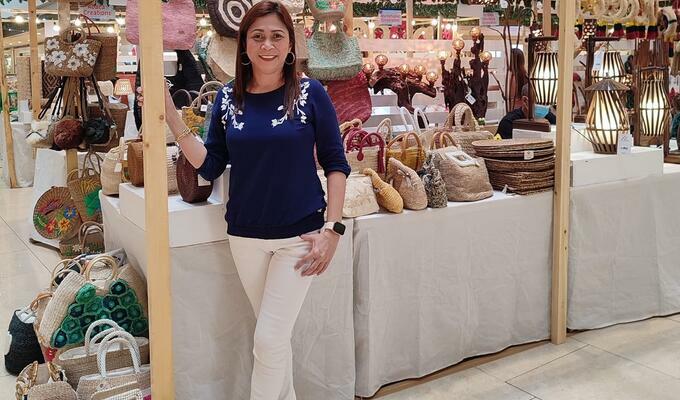
Crafting beautiful and sustainable handbags, baskets, mats, and hats, this family-run business has gained international recognition for its heirloom-quality creations.
RCB Crafts and Designs founder Rochelle Briones and her team of talented homemakers have mastered the art of handmade products and are making their mark in the European market. They are using traditional and indigenous materials like abaca, raffia, and seagrass.
The thriving RCB Crafts and Designs is now generating impressive annual revenues of P1 million by exporting 30 percent of its goods directly to Japanese buyers.
Striving for global success, the company's artisan-crafted products also found customers in Brazil and across the European Union (EU).
Since 2017, Rochelle has been expanding the family business by exporting to European countries.
To appeal to EU buyers' tastes and preferences, Rochelle's artisans often add a personal touch by hand-embroidering phrases such as "au revoir" and "merci" on exported handbags, ensuring that their products stand out in this highly competitive market.
RCB products are exported indirectly to Europe through Larone Crafts based in Makati City. But Rochelle is also actively exploring more opportunities to reach foreign buyers directly.
Rochelle said that DTI gave them their biggest break in the global stage when the agency extended an invitation to participate in the Ambiente trade fair in Germany.
“The power of attending trade shows is important to build a B2B relationships and networking opportunities,” said Rochelle. With the help of the DTI, Rochelle has had successful exports to Hong Kong, Thailand, and Japan.
Aside from opening markets for them, the DTI also assisted them in product development, particularly on market-driven design trends.
Rochelle also feels privileged to have attended sessions by handicraft designers through DTI.
With expert guidance provided by DTI on designing products based on market trends, RCB Crafts and Designs has successfully expanded its export business. The company has been invited to product critiquing sessions with designers experienced in handicrafts, which have been instrumental in their growth.
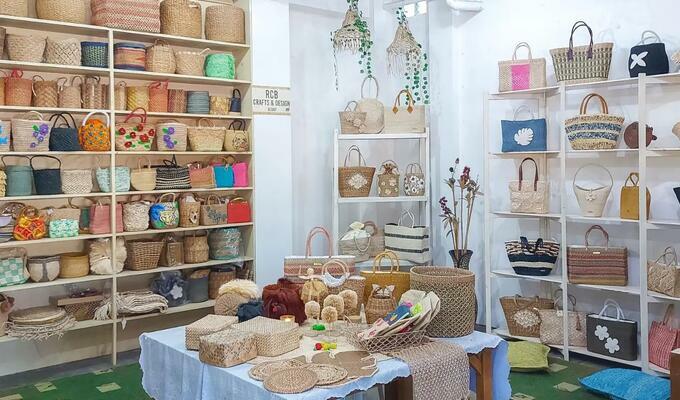
Additionally, the Philippine Exporters Confederation Inc. (PHILEXPORT) provided RCB Crafts and Designs with essential support in production, packaging, and documentation-related matters. This assistance has enabled the company to complete vendor requirements and prepare all necessary documentation to begin exporting independently.
Rochelle credits these partnerships for the crucial role they played in her business’ success. The EU has become a more lucrative market for artisanal handicrafts.
Rochelle further expanded her network in EU by participating at the EU-Philippines Conference, which was organized by the ARISE Plus Philippines project—an event that solidified her resolve to secure direct buyers within the EU market.
Her strategy is to come up with customized products.
Rochelle also realized that its expanding business is largely due to the skilled homemakers, whom she employed at the shop.
She takes pride in showcasing their talents on the global stage. As the company grows, this also trickle down to her workers, providing their families financial stability.
This allows their children to have the freedom to explore different opportunities in other regions, such as Metro Manila.
“I am always thinking about them. My workers can financially support their families, which in turn allows them to let their children explore other opportunities in places such as Metro Manila,” she added.
Rochelle's success is a testament to the impact of socially responsible and empowering business practices—one that benefits not only an individual but an entire community. (Bernie Cahiles-Magkilat)
How Theocolates became an exporter
With the help of the government through the Department of Trade and Industry (DTI), Filipino chocolate maker Theocolates was able to enter the European Union (EU) and other foreign markets but not without challenges such as meeting the steep requirements to be able to export your brand.
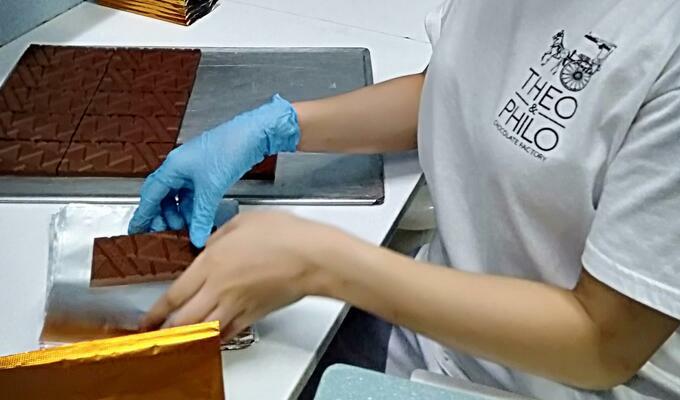
And with DTI’s export promotion arm, the Center for International Trade Expositions and Missions (CITEM) and its unit the International Trade Centre (ITC), Philo Chua the owner of Theocolates said they were able to export their premium chocolates at last.
The brand Theo & Philo earns about 20 percent of its annual business revenue from exports, and five percent of these come from EU.
In an article that first came out in an ITC platform, Chua said he wanted his story, specifically the story of his Philippine chocolate told, to show the world that local cacao from Davao can hold its own in the global stage.
It all started in 1997, when Chua was in school in Pittsburgh in the US. He related to ITC that around that time, he emailed a friend about forming a brand around Philippine cacao, an idea first inspired by a chocolate shop near where he lived while studying abroad.
At 44, he made all his ideas into a reality and he began to develop a niche product. This took a long process of developing the kind of chocolate brand he wanted. He was careful about choosing the best ingredients for his single-origin premium chocolate from Davao.
Based on the ITC article, Chua had P1 million in initial capital in 2010, and ready to market his brand that he named Theo & Philo.
When the Theo & Philo brand was finally in the market, it was soon getting the attention it deserved from food bloggers. “We never sought out people. Buyers found us perhaps by word of mouth,” Chua was quoted in the article.
This is where the DTI came in to help the brand get an international market through export. It was tedious work, they had to first get local Food and Drug Authority (FDA) permits.
But, a DTI registration was the beginning of it all and gave the new brand access to a whole new world of business. Chua then attended several DTI seminars to guide him about how to export.
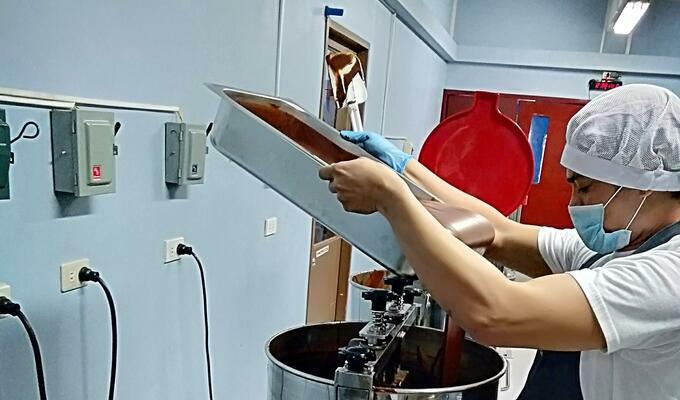
DTI’s CITEM encouraged Chua to market his brand by participating in the International Food Exhibition or IFEX Philippines regularly. It was a good start to network with both local and international buyers.
Two years later since its launch, by 2012, Chua was finally exporting his chocolate products to Germany and the Netherlands in Europe, and to Japan, Taiwan and in the US where all his ideas began.
Chua’s first export market was the EU with a first buyer in Germany.
There were many challenges such as product labelling which was a consideration in the EU market due to sustainability issues. They had to comply with all requirements to enter that market.
According to the ITC article, Chua believed that the “best chocolates are from Europe” and if his chocolates find its niche there then “it is already an endorsement of top quality.”
He learned a lot from his EU experience. For example, based on the ITC, EU requirements for food ingredients such as the percentage of cocoa in chocolate bars and products are stringent.
Once complied, Chua moved on to learning about the EU Generalized System of Preference Plus (GSP+) and about Registered Exporter (REX) system, a system of self-certification of origin for exporters wishing to benefit from GSP+, through a Dutch distributor in Amsterdam, said ITC.
The rest of it, as they say, is now history. Theocolates is now an exporter. It needed to expand its workforce at its facility in Valenzuela, Metro Manila, from just three to 28 workers at the time of the ITC article.
Today, his chocolate products are sold at coffee shops and specialty stores abroad. In the Philipines, they are available at duty-free and other local shops. They are produced as chocolate bars, chocolate-coated mangoes, chocolate-covered nuts, hot chocolate mix, and chocolate spreads.
“Our best-selling products are our chocolate bars—in particular, the dark chocolate with green mango and salt, and the dark chocolate with siling labuyo (chili),” said Chua in the ITC article. (Lee C. Chipongian)
Nature's Legacy spreads its wings overseas
Starting as an advocacy to help poor communities in Cebu over four decades ago, Nature’s Legacy home décor has spread its wings to North America and Europe with the support of the Department of Trade and Industry.

The founders of Nature’s Legacy, husband-wife team Cathy and Pete Delantar, came from humble beginnings with no plans to start a manufacturing business.
However, upon witnessing the poverty in their surrounding community, they made a commitment to help by creating employment opportunities.
Cathy and Pete then transformed natural resources into patented sustainable materials to create inspired pieces for the home, for business, and for life.
In turn, the couple accommodated unskilled craftsmen, taught them the basics of material application, and turned them into productive individuals.
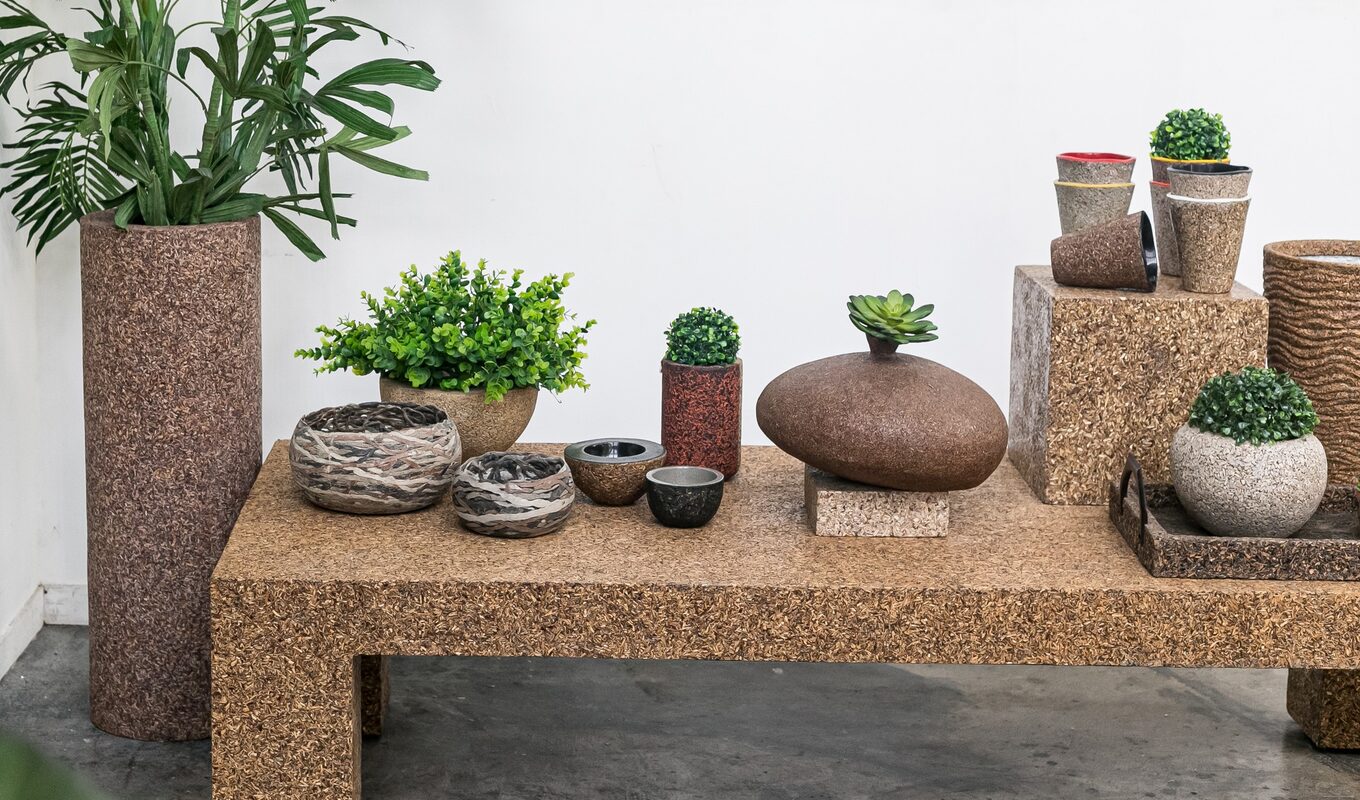
Initially, Nature's Legacy faced a challenging journey as a sustainable manufacturer. Its flagship product, Stonecast—a handmade material that mimics real limestone—was quickly imitated by other players in the industry.
“Realizing that we could not compete on price, the company decided to focus on creating something unique and different,” Pete shared.
During a walk on their property in Compostela, Cebu, the founders stumbled upon piles of forest debris that were being used solely as firewood. With a background in material application, they soon transformed the readily available but ignored raw materials into the sustainable invention Naturescast®.
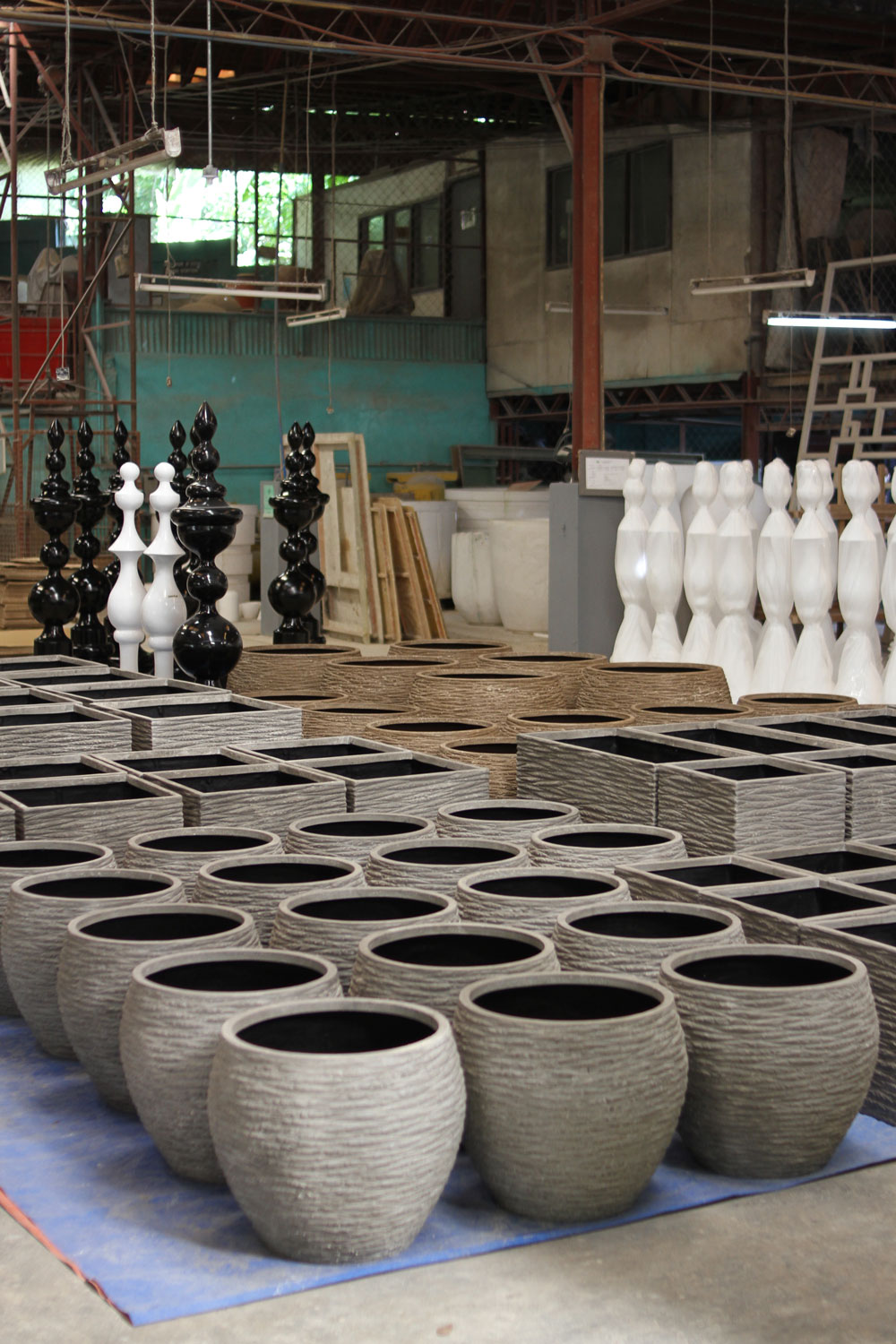
Their current range of products includes Naturescast®, Nucast®, Marmorcast®, and Stonecast. All four products align with the manufacturing company’s sustainable product principles: recycled, biodegradable, ethical, and communal.
In 1983, Nature’s Legacy began exporting to Canada and the United States. At that time, the company's revenues ranged between P5 million to P6 million per year and the foreign exchange rate was P18 to P20 to the dollar.
In 2002, the company made its first exports to Germany. Today, almost 40 percent of Nature’s Legacy’s total exports go to Switzerland and EU member states including the Netherlands, France, Italy, and Slovenia.
One of the company’s objectives is to attract customers who prioritize sustainability, and who recognize the value and significance of sustainable, circular, and innovative products and practices. This is the reason the company has zeroed in on the EU as its niche market.
The EU’s Generalized System of Preference Plus (GSP+) scheme for Philippine exporters has created an attractive incentive for firms to do business with EU member states since 2017, according to Pete, who learned about the scheme through the Philippine Exporters Confederation, Inc. (PHILEXPORT) and the Philippine government’s Department of Trade and Industry (DTI).
“We learned that it provides advantages not only to our company but also to other Philippine exporters who sell products to the EU. The elimination of tariffs on over 1,000 Philippine products under GSP+ can enhance exports and increase competitiveness.”
Pete expressed their appreciation for the continued support from the DTI. The company received training, seminars, participation in trade shows, support in product development, and business matching and networking.
“The agency allowed us to know customers better—their European culture and design preferences. By knowing the market, we can tailor-fit our products and innovation to match their needs,” he shared.
DTI’s publications were instrumental in Nature’s Legacy products getting noticed by the buying public. Pete and Cathy’s engagement in various missions and programs added to the buyer’s familiarity with the products.
Upon the recommendation from PHILEXPORT, the company was engaged in the ARISE Plus Philippines project, an endeavor designed to support small- and medium-sized businesses in the country and open new doors of opportunity.
“Our aspiration is that, with the support of ARISE Plus, we can expand our reach to more buyers and customers who prioritize and share the same values of Sustainability, Circularity, and Innovation,” said Cathy.
This is also in line with Pete and Cathy’s future goals for Nature’s Legacy. Pete and Cathy, tenacious experts who never give up, plan to introduce into the market a compact yet revolutionary shelter for people facing disasters or in need of temporary lodging during a transitional period.
The envisioned shelter is a breeze to assemble, making it an ideal solution for women and elderly members of the community looking to contribute to building a resilient dwelling during trying times.
The ARISE Plus Philippines project is enabling Philippine exporters to take advantage of EU market access and the trade privileges granted under the GSP+.
It supports the overall EU-Philippines trade relationship and trade-related policies. It is funded by the EU with the International Trade Centre (ITC) as the technical agency for the project.
ARISE Plus Philippines is a project of the Government of the Philippines, with the Department of Trade and Industry as lead partner together with the Department of Agriculture, Food and Drug Administration, Bureau of Customs, the Department of Science and Technology, as well as the private sector. (James A. Loyola)